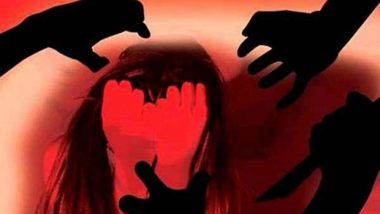New Delhi [India], Apr 22: Hours after the Centre gave its nod to an ordinance to amend the existing Protection of Children from Sexual Offences Act (POCSO) Act, allowing courts to award death penalty to those convicted of raping minors, four incidents of sexual assaults were reported in different parts of Uttar Pradesh.
In the first incident, a seven-year-old girl was allegedly raped by a middle-aged man in Rampur. The minor girl's father said in a statement that his daughter had gone to fetch some water when a man seduced her and sexually assaulted her in a secluded area. The man, who fled after the incident when the girl fell unconscious, was later captured by the police. Superintendent of Police (SP) Rampur Vipin Tada said that an information was received in Swar police station that a girl was allegedly raped. "The accused has been arrested and a case has been registered against him. We are investigating the matter. The girl is now in the hospital for medical treatment," Tada told ANI.
In the second incident, an 11-year-old girl was allegedly raped by her uncle in Vishnugarh area of Kannauj. The girl was reportedly alone at home when the crime took place. Her family was away at that time. When her father returned, he saw her daughter in a bad condition. On learning that his brother had allegedly sexually assaulted her daughter, he went to the police station to file an FIR. Superintendent of Police (SP) Kannauj, Keshav Chandra Goswami told ANI that a search operation was launched to nab the accused.
In the third incident, a 13-year-old minor was allegedly raped by a doctor in Muzaffarnagar. The crime, which took place on Tuesday, occurred when the girl reportedly went to the doctor's clinic after suffering from a headache.
The minor's family told the police that she was missing for the next two days before she came back in an inebriated condition. On learning the matter, the family filed a complaint at the police station. Superintendent of Police (SP) Ajay Sehdev told ANI, "The minor has been sent for medical examination. She was drugged by the accused and then he sexually assaulted her. The accused has been arrested. During the investigation, we found some objectionable items in the clinic and we are questioning him further."
Lastly, a minor was allegedly sexually assaulted by three persons in Moradabad and a video of the whole incident was filmed. The minor told in a statement that when she used to go to the fields, the three persons used to harass her constantly. She was reportedly alone at home and was doing household chores when the trio barged into her house and allegedly sexually assaulted her. Superintendent of Police (SP), Civil Lines, Aparna Gupta said that the police launched a search operation against the culprits and efforts were on to delete the video that became viral on social media.
With the ongoing Unnao, Kathua, Surat and Indore rape cases, the Indian social media has been abuzz with the words - "rape horror".
The Cabinet, chaired by Prime Minister Narendra Modi on Saturday approved the promulgation of the Criminal Law (Amendment) Ordinance, 2018, for effective deterrence against the commission of rape, thereby instilling a sense of security among women and especially young girls in the country. Taking cognisance of the recent incidents of rape in various parts of the country, the Cabinet approved an ordinance to be promulgated to provide for stringent punishment for perpetrators of rape particularly of girls below 16 years, and the death penalty to be awarded to rapists of girls below 12 years of age. The minimum punishment in case of rape of women was increased from the rigorous imprisonment of 7 to 10 years, extendable to life imprisonment. In case of rape of a girl under 16 years, the minimum punishment was increased from 10 to 20 years, extendable to life imprisonment.
The Cabinet also decided to put in place a number of measures for speedy investigation and trial of rape cases. It was prescribed that the time limit for investigation of all rape cases had to be mandatorily completed within two months. Furthermore, the time limit for completion of the trial of all rape cases was ascertained for two months. The Cabinet also provided for a six-month time limit for disposal of appeals in rape cases. In terms of gangrape, the Cabinet stated that the punishment for the gangrape of a girl under 16 years of age would invariably be imprisonment for the rest of the life of the convict.
Among other provisions of the ordinance, the Cabinet prescribed that there would be no provision for anticipatory bail for a person accused of rape or gang rape of a girl under 16 years. It was also provided that the court would have to give a 15-day notice to the Public Prosecutor and representative of the victim before deciding bail applications in the aforementioned category.
In order to give effect to the legal provisions and to improve the capacity of the criminal justice system to deal with rape cases, the Cabinet stated that new fast-track courts would be set up in consultation with the states/Union Territories (UTs) and high courts. It also mandated the creation of new posts of public prosecutors and related infrastructure in consultation with states and union territories.
The Cabinet also provided for special forensic kits for rape cases to all police stations and hospitals, forensic labs in each state and union territory and dedicated manpower for investigation in a time bound manner.
Furthermore, the National Crime Records Bureau was directed to maintain a national database and profile of sexual offenders. This data will be regularly shared with states/UTs for tracking, monitoring and investigation, including verification of antecedents by police.
The Cabinet also stated that the present scheme of One Stop Centres for assistance to rape victims would be extended to all districts in the country.
Soon after, the Centre submitted its report while responding to a public interest litigation (PIL) filed by Advocate Alakh Alok Srivastava, seeking the maximum sentence of the death penalty to those offenders involved in the rape and brutal murder of children between the age group of 0 to 12.
The Supreme Court's three-judge bench, headed by Chief Justice of India (CJI) Dipak Misra along with Justices AM Khanwilkar and DY Chandrachud, fixed the matter for further hearing on April 27.













 Quickly
Quickly





















